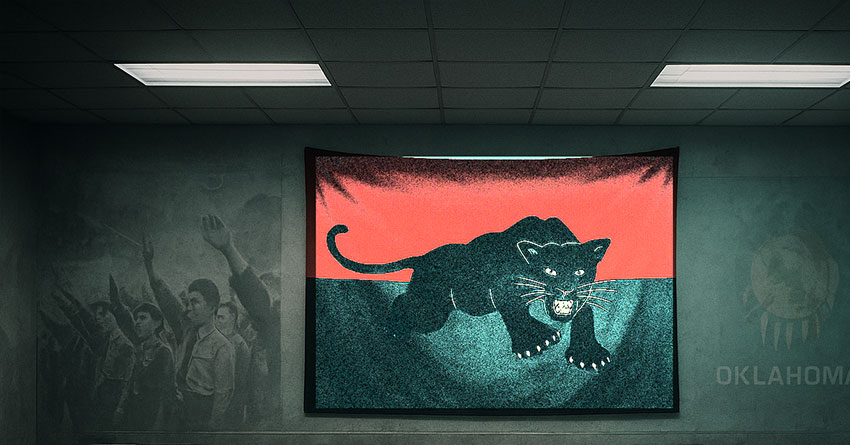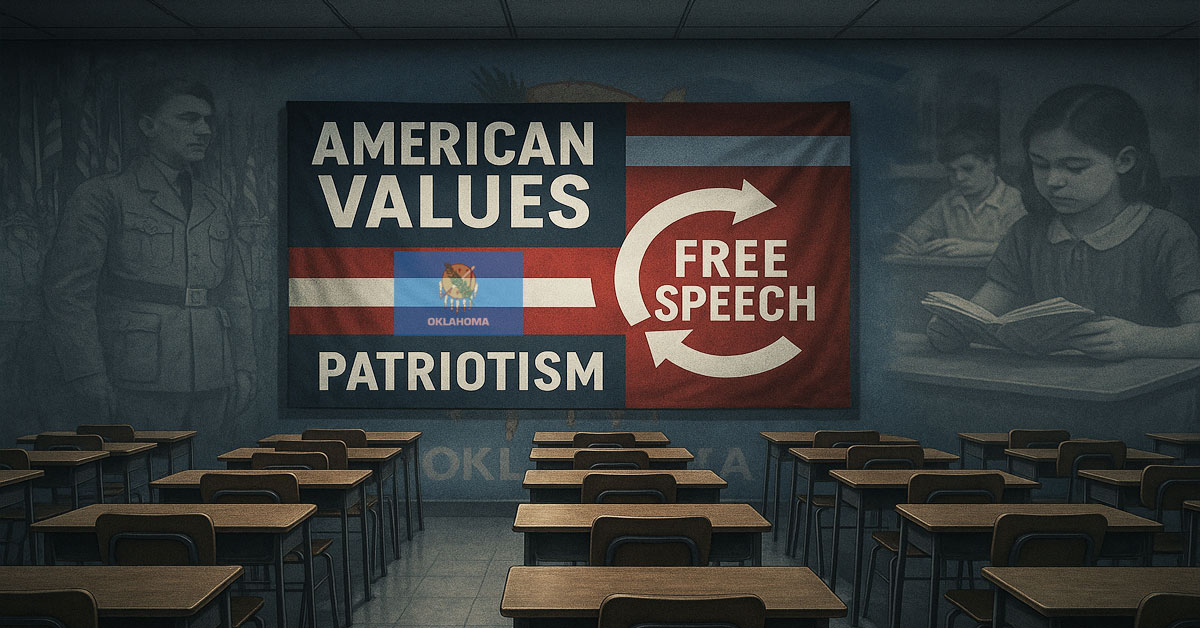By InnerKwest Editorial Board | September 25, 2025
A Disturbing New Precedent
Oklahoma’s State Superintendent Ryan Walters has announced a plan that every public high school in the state must host a chapter of Turning Point USA (TPUSA) — the conservative youth-activist organization rebranded locally as “Club America.” While the practical details remain vague, Walters has made clear that non-compliant schools may face threats to their accreditation. This is not merely another school club. It is a state-sanctioned effort to embed a partisan political machine into classrooms, and the implications for impressionable children are staggering.
Turning Point’s Political DNA
Turning Point USA is not a neutral civic-engagement group. Founded by Charlie Kirk, it has made a national name by staging culture-war battles on college campuses, promoting anti-“woke” ideology, and aligning itself with Trump-era politics. Its playbook leans heavily on slogans, confrontation, and polarizing narratives — tools designed less for open inquiry and more for recruitment.
To insert this organization into every Oklahoma high school, under the authority of the state, is to hand an entire generation of teenagers a partisan roadmap before many of them have developed the critical reasoning skills to question or balance what they are told.
The Indoctrination Risk
High school is a formative period. Students are still learning to process competing ideas, challenge assumptions, and carve out their own values. By privileging one political group with official state backing — complete with sample bylaws, activism kits, and recognition pipelines — Walters is essentially stamping a seal of approval on a single worldview.
This risks several damaging outcomes:
- Bias Implantation: Students, eager for belonging, may absorb partisan talking points as unchallenged truth.
- Peer Pressure: With state support and structured resources, the club may carry social weight that makes non-participation feel like dissent.
- Chilling Effect: Students and teachers who disagree may self-censor to avoid conflict or reprisal, hollowing out the school’s role as a safe space for inquiry.
- Polarization: Rather than broadening horizons, schools risk becoming training grounds for one side of America’s culture war.
Historical Echoes: When States Capture Youth
History offers sobering examples of what happens when governments seize the minds of the young.
- Hitler Youth (Nazi Germany): Beginning as a voluntary organization, it became effectively mandatory by 1936. Its mission was clear — to mold boys into loyal soldiers of the Reich and to condition girls for obedience and motherhood. Schools were leveraged as pipelines, and dissenting families were marginalized.
- League of German Girls: The female counterpart indoctrinated young women into racial purity and subservience to Nazi ideology.
- Komsomol (Soviet Union): A state-run youth league designed to ensure loyalty to Communist Party doctrine, often at the expense of independent thought.
- Mao’s Red Guard (China): Mobilized young people as political enforcers, teaching obedience not to truth or inquiry, but to a personality cult.
The common thread in all these cases was not simply youth engagement — it was state-directed indoctrination dressed up as civic duty. Walters’ move in Oklahoma is not yet at that scale, but it echoes the same dangerous logic: when governments use schools to implant partisanship in immature minds, democracy itself becomes fragile.
Oklahoma’s Haunted Ground: Tulsa’s Shadow
It is impossible to examine Walters’ initiative in a vacuum. Oklahoma is not just any state. It is the ground where one of the most violent racial pogroms in American history took place — the 1921 Tulsa Massacre. A thriving Black business district, Greenwood, was reduced to ash under coordinated white mob violence, aided by local authority. That wasn’t centuries ago; it was just over a hundred years — within living memory for some families still carrying the trauma.
When the state now announces the forced planting of a partisan youth movement into every high school, it risks awakening those historical echoes. Communities that remember the destruction of Black prosperity in Tulsa will see this as yet another state-sponsored narrowing of who belongs and whose voice is legitimate.
And history teaches us that such narrowing often produces its opposite. Just as Walters seeks to normalize Turning Point USA’s brand of activism, other groups — including those seen as radical or militant by mainstream society — could justifiably feel compelled to converge on Oklahoma as a counterweight.

Picture the New Black Panther Party (NBPP) — established in 1989 in Dallas, Texas — rallying in Oklahoma and presenting themselves as defenders of youth autonomy against state-driven indoctrination.
This is the cycle of escalation: when one group uses the apparatus of the state to press its agenda, other communities, often marginalized and historically harmed, will mobilize to defend themselves. Instead of classrooms being centers of critical inquiry and safe growth, they become battlegrounds in the larger partisan war.
The lesson of Tulsa should loom large: when institutions fail to protect pluralism, communities fracture — and violence often follows. Walters’ plan risks re-opening a wound that Oklahoma, and the country at large, has never fully healed.
Zealous Bigotry in the Classroom
This is not education — it is political zealotry wearing the mask of pedagogy. Walters’ initiative reflects an agenda antithetical to nurturing a learning environment where all students can thrive. By funneling tax-funded schools into partisan channels, Oklahoma risks normalizing bigotry, exclusion, and division at a time when the nation is already at a tipping point.
The move is especially dangerous because it operates on immature minds — children still forming their sense of fairness, democracy, and civic responsibility. Instead of teaching students how to weigh evidence, respect differences, and practice critical citizenship, the policy implants pre-packaged answers.
Legal and Ethical Fault Lines
There are unresolved questions that cut to the core of democratic governance:
- Constitutionality: Can a state superintendent compel public schools to host partisan political organizations?
- Equal Access: Will other groups — progressive, moderate, independent — be granted equal institutional support?
- Accreditation Leverage: Threatening accreditation for refusal blurs the line between oversight and coercion.
It is difficult to imagine this initiative surviving unchallenged in courts. Yet the chilling effect may already begin long before a judge intervenes.
The Message to Children
Beyond the politics, the symbolism to students is profound. Walters’ mandate says: your civic identity is not for you to shape, it is for us to deliver. It says: belonging comes through conformity to the state’s chosen ideology. For children navigating identity, morality, and responsibility, this is a betrayal of trust.
Schools are meant to be places of exploration, not indoctrination. When classrooms become recruitment grounds, the long-term consequences — cynicism, division, and distrust of institutions — will not be easily undone.
The Tipping Point
America is already riven along partisan, cultural, and racial fault lines. To deliberately widen those gaps by commandeering education is reckless governance. Walters may believe he is securing the next generation of conservative voters, but in reality he is deepening the fractures that leave our democracy brittle.
A learning environment should mute bias, not amplify it. It should empower children to think, not program them to march. Walters’ plan in Oklahoma is not just a local experiment. It is a warning shot for the rest of the nation. If indoctrination replaces education, the cost will not be measured in elections but in the integrity of the republic itself.
Closing Thought
The InnerKwest editorial board calls this policy what it is: a dangerous intrusion of bigotry and zealotry into the public school system. Oklahoma’s children deserve classrooms free of partisan capture, where inquiry, diversity, and truth can thrive. Anything less is a betrayal — not only of students, but of democracy itself.
A Gentle Ask: Some stories ask to be read; others ask to be shared. We believe this is the latter. If this piece resonates with you, pass it forward — because awareness is the first defense of democracy.
Support InnerKwest: Powering Truth & Excellence with Bitcoin
At InnerKwest.com, we are committed to delivering impactful journalism, deep insights, and fearless social commentary. Your Bitcoin contributions help us execute with excellence, ensuring we remain independent and continue to amplify voices that matter.
Support our mission—send BTC today!
🔗 Bitcoin Address: 3NM7AAdxxaJ7jUhZ2nyfgcheWkrquvCzRm© 2026 InnerKwest®. All Rights Reserved | Haki zote zimehifadhiwa | 版权所有.
InnerKwest® is a registered trademark of Inputit™ Platforms Inc. Global
No part of this publication may be reproduced, distributed, or transmitted in any form or by any means without prior written permission. Unauthorized use is strictly prohibited.
Thank you for standing with us in pursuit of truth and progress!![]()


